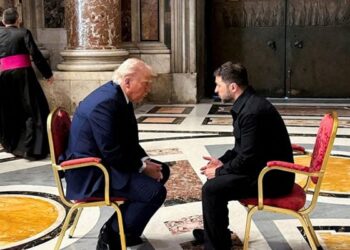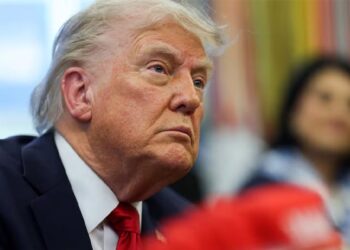Vladimir Putin Meets U.S. Envoy Amid Heightened Global Tensions
Russian President Vladimir Putin greets U.S. President Donald Trump’s special envoy, Steve Witkoff, during a meeting in Saint Petersburg, Russia on April 11, 2025. — Reuters
- Witkoff engages in discussions with Putin in Russia.
- The meeting occurs as U.S. tensions with China and Iran escalate.
- Negotiations for a ceasefire in Ukraine seem to have stalled.
MOSCOW: On Friday, Steve Witkoff, a special envoy from U.S. President Donald Trump, met with President Vladimir Putin in Saint Petersburg to discuss a potential peace agreement concerning Ukraine, as Trump urged Russia to take swift action.
State television broadcasted footage of Putin welcoming Witkoff in the presidential library of Saint Petersburg at the outset of their discussions. Prior to the meeting, the Izvestia news outlet shared a video of Witkoff leaving a hotel in the city alongside Kirill Dmitriev, who serves as Putin’s investment envoy.
Witkoff has become a pivotal player in the fluctuating relationship between Moscow and Washington, amid discussions regarding prospective joint investments in the Arctic and in Russia’s rare earth mineral sectors.
However, the timing of these discussions is precarious, as the dialogue between the U.S. and Russia aimed at negotiating a ceasefire appears to have stalled due to disagreements over the terms of a complete cessation of hostilities.
Trump, growing increasingly impatient, has mentioned the possibility of enforcing secondary sanctions on nations purchasing Russian oil if he believes Russia is delaying a resolution on Ukraine.
On Friday, he posted on Truth Social: "Russia has to get moving. Too many people are dying—thousands each week—in a terrible and senseless war. A war that should have never occurred, and wouldn’t have, if I were still President!"
Putin has indicated a general willingness to agree to a full ceasefire but has highlighted that numerous fundamental conditions remain unresolved, particularly the underlying issues that led to the conflict. Specifically, he insists that Ukraine should not be permitted to join NATO, that its military size needs to be reduced, and that Russia should gain complete control over the four Ukrainian regions it claims, even though it does not fully oversee any of them.
Currently, Russian forces control nearly 20% of Ukraine, and the Kremlin maintains that Russia holds a favorable bargaining position, expecting Ukraine to concede.
Kyiv has argued that Russia’s conditions would amount to a complete surrender.
Possibility of Trump-Putin Meeting?
Kremlin spokesperson Dmitry Peskov stated that a discussion regarding a face-to-face meeting between Putin and Trump could take place during the Witkoff-Putin talks.
Although the two leaders have held phone conversations, they have yet to meet in person since Trump returned to the White House in January for a second term.
However, Peskov downplayed expectations for significant outcomes from the Witkoff-Putin discussions, stating that the U.S. envoy’s visit would not be "historic" and that no significant breakthroughs were anticipated.
He emphasized that the meeting would serve as an opportunity for Russia to express its "concerns," amid mutual accusations of violating a previously agreed-upon pause in attacking each other’s energy infrastructure.
This marks the third time this year that Witkoff and Putin have met, coinciding with increased tensions between the U.S. and Iran and China—both of which are close allies of Russia, largely due to Iran’s nuclear ambitions and a burgeoning trade conflict with China.
Earlier on Friday, Witkoff visited a synagogue in Saint Petersburg before heading to Oman for discussions with Iranian representatives over the nuclear program. Trump has threatened military retaliation against Tehran if a satisfactory agreement is not reached, while Moscow has repeatedly offered its assistance in facilitating a diplomatic resolution.
U.S. and Russian officials recently reported progress during talks in Istanbul aimed at normalizing the operations of their diplomatic missions as relations begin to rebuild.
A previous meeting in February saw Witkoff returning to the U.S. with Marc Fogel, an American educator whom Washington claimed was wrongfully detained by Russia. Additionally, a Russian-American spa worker, Ksenia Karelina, who had been sentenced to 12 years in a Russian prison, was exchanged for Arthur Petrov, who the U.S. accused of running a global smuggling ring supplying sensitive electronics to the Russian military.






